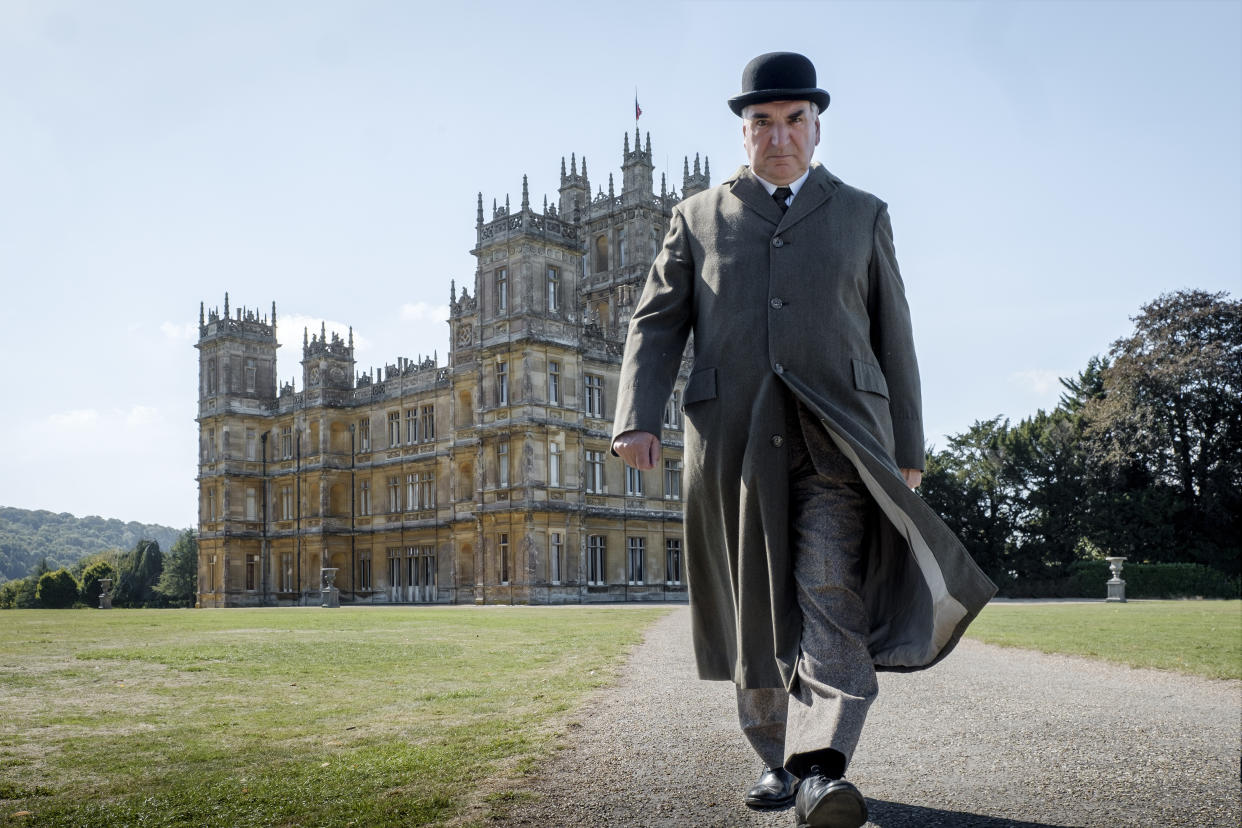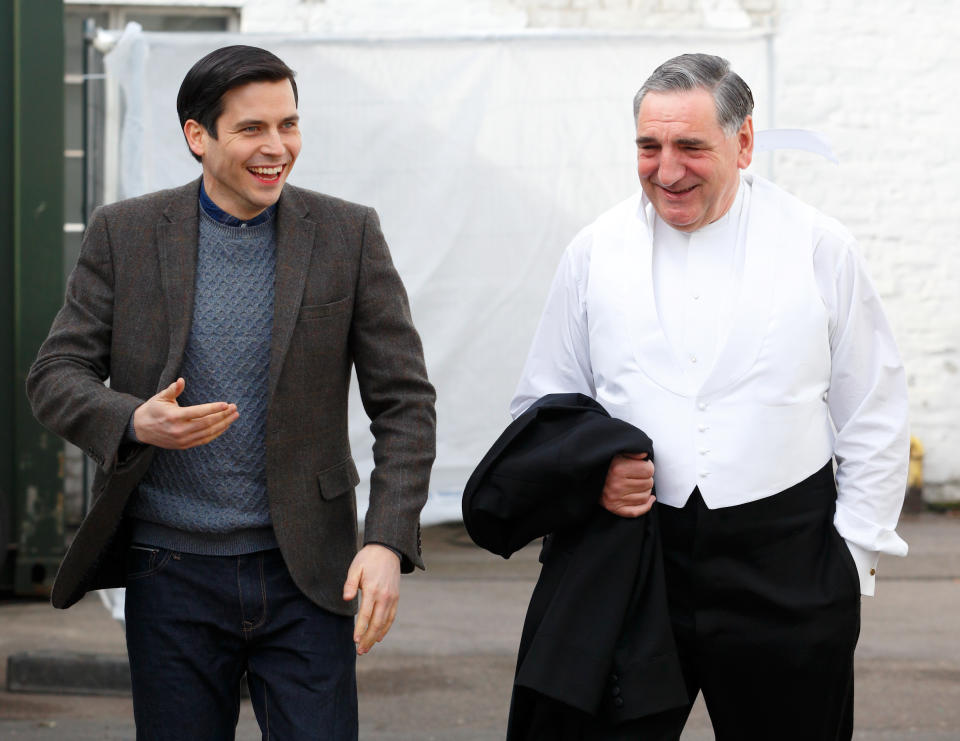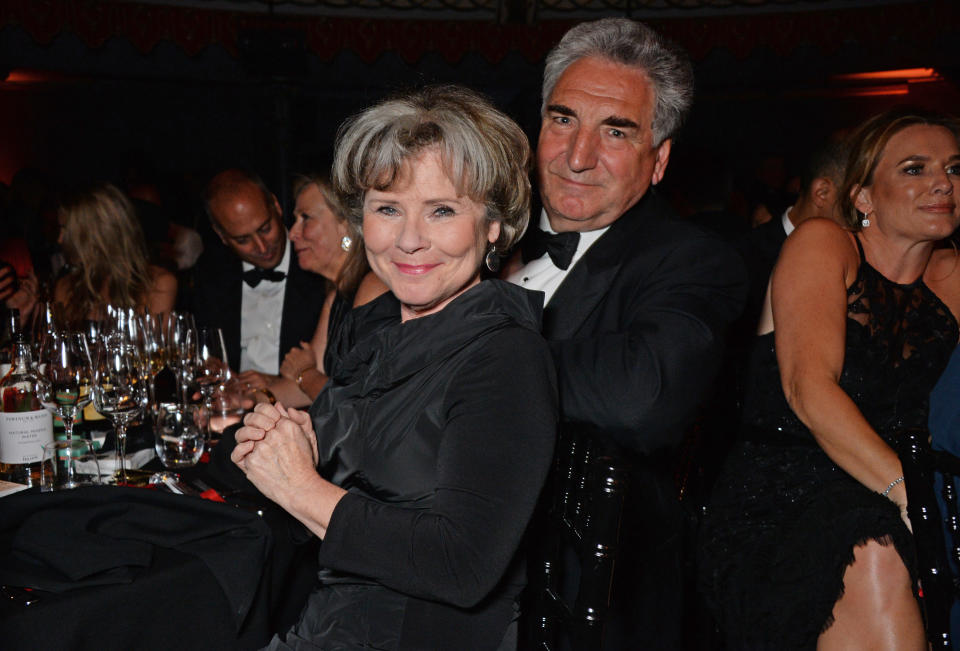'Downton Abbey' set visit report: All the gossip from the servant's hall

We are in the servants hall at Downton Abbey and all our favourite ‘Downstairs’ characters are gathered together. Butler Mr Carson is at his rightful position at the head of the table, his wife, housekeeper Mrs Hughes, by his side. Cook Mrs Patmore, kitchen maid Daisy, bad-boy butler Thomas Barrow and lady’s maid Anna Bates. It’s as if they’ve been here, carrying on their daily lives, ever since the final credits rolled on the TV series on Christmas Day 2015.
It’s October 2018 and we’re at England’s historical Ealing Studios having accepted an invitation to visit the set of the Downton Abbey movie.
So what brings us back into the Crawley household once again? Here’s what we managed to find out about the film after having a good old natter with the servants...
Bigger and better

Speaking about being back on set Lesley Nichol who plays Mrs Patmore, confides, “It's almost the same, it’s all just slightly bigger, but it's like coming home.” And she’s right, Downton devotees will not be disappointed. Everything is going to appear just as it was - just on an even larger and grander scale for the cinema.
“I think it’s going to look really amazing,” Joanne Froggatt (Anna Bates) tell us. “Because there are some big scenes with everybody and some big set pieces which are beautiful and cinematic. I think anybody that loved the show will enjoy the movie.
“It's definitely a feel good movie.”
All the cast admit it seems like hardly a day has gone by since they were all working together on the show, which ran for six years.
Sophie McShera, who plays Daisy, gushes, “We all see each other all the time anyway, so we're all friends. It doesn't feel that long ago. But obviously, it's really lovely to get together in this context again.”
A right royal fuss
If you’ve watched the trailer you will know that the familiar crunch of gravel on the driveway heralds the arrival of royal visitors to Downton. It is 1927 and King George V and his wife Queen Mary are coming to stay with Lord and Lady Grantham. Their impending visit has got everyone at Downton feeling emotional for various reasons - apart from the Dowager Countess aka Dame Maggie Smith of course, who is suitably unimpressed.
Read more: Downton Abbey trailer drops and there's a Royal arrival
Butler Carson, played by stalwart Jim Carter, is back at the house, despite having retired at the end of the show.
Carter, 71, explains: “We start the film with me just in retirement back at the cottage digging in the garden, fairly bored. I think he's always regretted retirement - he wouldhappily carry on ‘til he dropped.
“So Carson is delighted, I think, when Lady Mary asks him to come back and take over.
“Carson is happy to be back but spends most of his time in a flap because he doesn't want to put a foot wrong - because obviously he adores royalty.”
Butler Molesley is also back for the royal visit, despite resigning to become a teacher. He decides his pupils can wait - he does not want to miss a chance to see their majesties.
“You have to remember that back in 1927, nobody would have seen the royals before, unless you were very lucky,” muses Kevin Doyle. “There's no TV footage or anything like that. It would have just been like seeing movie stars. So the prospect of meeting them would have been beyond exciting. And that's his story throughout this film - just the anticipation!”
But not everyone is riled up about the royal visit for positive reasons. The end of the TV show saw maid Daisy developing some strong politically liberal views when it came to class.
McShera admits: “Daisy feels like it's possibly a bit over the top - everything that's happening. It definitely lights up that side of her again, and she's thinking, ‘Is this fair?’”
Barrow’s wild night out

Another servant who is not so happy about the royal guests is former valet Thomas Barrow, played by Rob James-Collier, who had been promoted to butler when Carson retired.
“Lady Mary doesn't quite trust Thomas as a butler. So she usurps him and brings back that old boy Mr. Carson, ruffling Thomas's feathers,” reveals James-Collier.
This leads to possibly the most exciting sub-plot of the film - Barrow, who has always struggled with his secret sexuality, discovering the emerging underground gay scene of the 1920s.
James-Collier shares, ”In a typical Barrow way thinks, ‘Sod you all I'll go and do something for me then!’ And then ends up in one of the first Edwardian gay bars, and then ends up in the back of a police van and ends up in jail.
“If he gets prosecuted that's it - game over, thrown in jail, never work in service again. He would probably have ended up on the streets. So it's high stakes.
“But it doesn't touch on them subjects because there's no time. He's too busy dancing!”
Barrow is introduced to the secret underworld by the King’s valet, who James-Collier hints could be a love interest.

“They're both definitely there in the moment, and trusting in each other. But can these things have a happy ending back then?”, he teases.
Despite being set in a time when homosexuality was a criminal offence, James-Collier reveals his gay character still has relevance to fans in 2019.
“I'm flattered when I get letters from all over the world, from lads and girls who are coming out, or thinking to come out. Some of the were inspired by Thomas to come out to their families, which is the ultimate highest form of why we do this, you know, to, to move people. To get these really personal letters is very humbling for me.”
A revolution at Downton
In preparation for the King and Queen’s arrival, their royal servants descend on the abbey and try to take control. But the Downton Downstairs team rally round in response.
James-Collier lets slip, “Barrow escapes jail and then he becomes part of the Downton mutiny that rebel against how they’ve been trodden all over by His Majesty’s staff. So he joins in the Downton revolution. Back then there was a big tremendous sense of pride in your work. So they strive and work together to to get their jobs back, as it were.”
Despite Daisy being the one dabbling in Communism, it is in fact Anna Bates who ends up staging a coup against the royal household.
Read more: Downton Abbey movie: Everything you need to know
Carter reveals, “Oddly enough, and I think it is [writer] Julian Fellowes’ feminist movement - he's got Anna Bates as the one who leads the revolution.
“It’s strange because upstairs Lord Grantham sort of handed over the reins to Lady Mary and downstairs, Anna Bates seems to be leading the resistance of the royal household.”
Bring your wife to work day

With Carson out of retirement he is back working alongside his wife, housekeeper Mrs Hughes.
Jim Carter’s real life wife, Imelda Staunton, joins the cast of the movie as a visiting member of the aristocracy Lady Bagshaw. So what was that like?
“Well, because she's Upstairs and I’m Downstairs we never speak to each other,” says Carter.
“We have a couple of days when we were in the dining room together, I refused to serve her any alcohol,” he jokes. “We travelled out to work together a couple of days. But seeing her across a crowded dining room was exciting as it got.”
Attention to detail

Downton creator Julian Fellowes meticulously researches the historical events and cultural traditions of the era while writing the script. [Royalty has realy visited Highclere Castle, where Downton Abbey is filmed.] But during filming Fellowes’ friend Alastair Bruce of Crionaich is on set at all times to act as official Historical Advisor.
Bruce admits there are “plenty” of inaccuracies he has spotted within the script.
But he adds “In a way where the inaccuracies come, is where the director interprets what’s written, and I'm there to make sure that we keep to what Julian intended.
“As far as I'm concerned, when you look at a drama, your conscience is carried along by the narrative, but your subconscious is also terribly hungry. And it's by getting the behaviour right, the mannerisms, right, and the protocols of the time correct, that you take people legitimately into time and then they can enjoy the story even more.”
Just a simple physical gesture by one of the actors can be an issue, Bruce reveals.
Read more: Downton Abbey actor Jim Carter awarded with OBE
“We had a we had a scene a couple of days ago, between Lady Mary and Anna. And at one point, she puts her hand on Anna, and I said, ‘Please don't do that.’ Because people didn't touch each other in those days. I think it's very natural that people who live in today's time want to be very emotional. And I think it's important not to fight the truth of a time by trying to bring to it the protocols that are very natural today.”
While the film is meticulous in its efforts to be historically accurate, even the stars admit there are few holes in the plot in order to pack it into a two hour film.
A glimpse behind the scenes of the #DowntonAbbeyFilm! See more from the cast and crew in Downton Abbey: The Official Film Companion, available in book stores on September 17th. pic.twitter.com/lbKYcXd37f
— Downton Abbey (@DowntonAbbey) August 13, 2019
Carson originally retired because he developed palsy and his tremoring hands made it impossible to serve at the table without spilling wine all over the guests.
Carter laughs, “That's been miraculous! So retirement has obviously been beneficial. Either the writer forgot about it, or let’s say that the removal of stress probably cured his shaking hands.”
Just as butler Molesley has abandoned his teaching job, cook Mrs Patmore seems to have completely forgotten her business venture running a Bed & Breakfast by the sea which she started at the end of the TV series.
Nichol admits, “That seems to have taken a slight sidestep because I guess it doesn't really fit in with what’s happening.”
Daisy had left Downton to live on her late husband’s family farm. But for the royal visit she is back at the big house.
McShera bemoans, “There's no farm! We keep talking about our lovely farm and we imagine that she's still living there. But no, we don't actually get to see it. I think it's just cramming everything into film's really hard.”
A message of monarchism?

Though set in the past, Downton Abbey has always been likened to a period soap opera - dealing with issues that are still just as relevant today such as heartbreak, rape, ambition and family feuds. And at a time when the Duchess of Cambridge and Duchess of Sussex have reignited in the public a love and admiration for the royal family, could it be that Julian Fellowes is trying to celebrate that with the theme of the Downton Abbey movie?
Phyllis Logan quips, “It does seem as though they can't seem to get enough of royalty, so we may as well shove some into Downton Abbey.”
Asked of he is a fan of the royal family, Carter says: “In the same way that I'm a fan of Westminster Abbey and castles. It is history, it’s us. So why not have the royal family? I think they have value to this country.”
But he is not sure royalty is the main theme of the movie.
“This story is more about manners,” he says. “The manners of how to behave in front of royalty.
“I'm a fan of being polite and manners and things like that. I do believe in good behaviour. Why wouldn't anybody believe in that?”
Downton Abbey arrives in UK cinemas from 13 September 2019.
Interviews conducted by Laura Hannam

 Yahoo Movies
Yahoo Movies 

